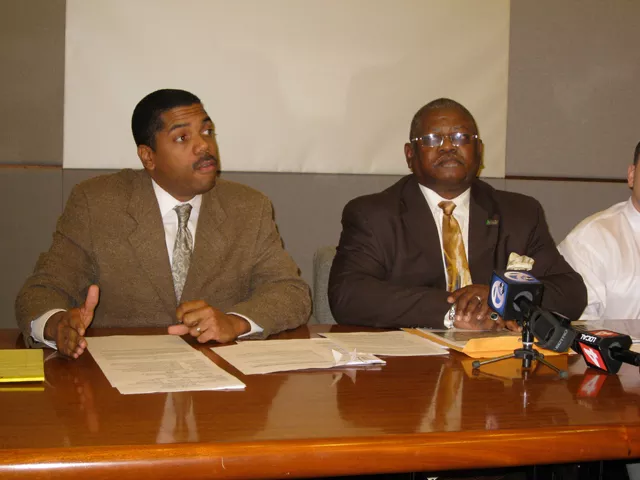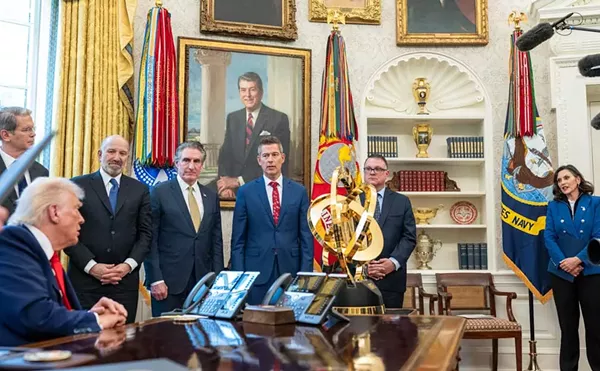Union blues & Detroit's red ink
Labor leaders say they can help, but that Bing won't listen

Audio By Carbonatix
[
{
"name": "GPT - Leaderboard - Inline - Content",
"component": "35519556",
"insertPoint": "5th",
"startingPoint": "3",
"requiredCountToDisplay": "3",
"maxInsertions": 100,
"adList": [
{
"adPreset": "LeaderboardInline"
}
]
}
]

The coalition of unions representing city of Detroit employees held a press conference last week to declare that they are trying to help solve the city's financial problems, but no one seems too interested in listening to what they have to say.
"A chief problem is that both the state and the city have ignored the voice of the people who know best the firsthand problems of the city, and — if anyone cared to pay attention — have tangible solutions,” said Ed McNeil, chairman of the Detroit Coalition of Labor Unions, reading from a prepared statement. "These are the workers of the city, who faithfully have taken orders while the city has headed off the financial cliff. The voice of the working man and woman should no longer be disregarded.”
Part of the message being delivered by McNeil and his fellow unionists is that they believe the state is intentionally trying to drive Detroit off a financial cliff.
The obvious question is, "Why would they want to do that?”
The answer, in so many words, is that as bad as things are, there are still millions upon millions upon millions of dollars to be scooped up in the form of lucrative contracts as more and more city work gets privatized, and the folks in Lansing want to be the ones who decide who gets to do the scooping.
That, anyway, is how the unions see things.
With the state seemingly poised to appoint an emergency financial manager, the labor unions are pointing out that Lansing's increased control over city finances — in the form of a consent agreement signed by the mayor and approved by the City Council on a 5-4 vote in April, and through the appointment of a nine-member financial advisory board as well as a chief financial officer and a program manager (each of whom gets paid $220,000 a year) — isn't exactly working out so far.
Given the extent of that intervention, said McNeil, the state "cannot evade blame for the worsening of city problems. Moreover, it cannot claim that more state control is the solution, not given this track record.”
The press conference, held Thursday, came two days after Gov. Rick Snyder announced that he was appointing yet another team to review the city's precarious financial situation.
"My administration has worked, and will continue to work in collaboration, with Mayor Bing and city officials to ensure a revitalized and successful Detroit,” Snyder said in a statement. "However, given the financial crisis that continues to grip the city of Detroit, we must move quickly to ensure city residents have continued access to essential services they expect and deserve.”
Of course, as this paper has previously noted, it could well be that the guv is equally, if not more, concerned about ensuring the bondholders the city owes billions to continue to get paid.
That, after all, is a key provision of the emergency manager law that he championed upon first taking office, and which voters thoroughly rejected at the ballot box in November.
We think it's also worth noting that the state, by implication at least, apparently felt a need to exercise greater control over the city because of its perceived incompetence when it came to evaluating just how bad things are financially.
So, how's it going now that the supposed pros have an inside view?
We'll let a report, prepared under the watchful eye of state Treasurer Andy Dillon earlier this month speak to that:
"A cash flow estimate in August, 2012 projected a cash deficit of $62 million by June 30, 2013, but estimates for October and November projected deficits of $84 million and $122 million respectively,” the report said.
Which means that the August evaluation was off by almost 100 percent. If this were an accounting class, we'd say that kind of miscalculation would earn a big, red "F” — for totally fucked up.
We called Dillon's office to talk about some of this, but they were apparently too busy tuning up their malfunctioning abacus to call back.
What we mostly wanted to hear from Dillon's folks was what they had to say about claims made by the unions that they actually had provided a road map to solvency.
The measures, which the unions say would reduce the city's annual deficit by $180 million a year, were part of a tentative pact the mayor had agreed to back in February, but then was halted at the insistence of the state because it didn't address certain "workplace rules” that McNeil told us have, to this day, never been defined.
Mayor Dave Bing's office says that many of the coalition's proposals have been implemented, but, despite our request for specifics, provided none.
The mayor's announcement last week that the city is stepping up efforts to collect unpaid taxes is among the measures the unions proposed — back in February.
Let's see, that's only — hold on while we count this up on our fingers — almost a whole damn year wasted until making a decision to do something that is so completely and obviously necessary.
Way to go, Bingo!
Unlike the treasurer's office, Bing's people at least responded with a statement from the big guy when we asked for a comment.
This is the reply we received:
"My administration negotiated with the City's labor unions in good faith. The union leadership knew all along that the Tentative Agreements must be approved by the State. Once we were informed by the State that the Tentative Agreements did not provide enough savings, I entered into a Consent Agreement with the support of City Council to prevent the appointment of an Emergency Manager. The City Employment Terms (CETs) that were later imposed provided the City with additional savings beyond those provided within the previously negotiated Tentative Agreements. My Administration looks forward to working with the City's labor unions to do whatever is necessary to fiscally stabilize our City and move our City forward.”
The thing is, if even most of those cost-saving and revenue-genereating measures proposed by the unions really were quickly and fully implemented by the administration, under the watchful eye of the state, why is it that we are still staring at a potential shortfall (as of right now, anyway) of $122 million come the end of this current fiscal year next June?
You don't need to be a CPA to see that something doesn't add up.
News Hits is written by Curt Guyette. Contact the column at 313-202-8004 or NewsHits@metrotimes.com





